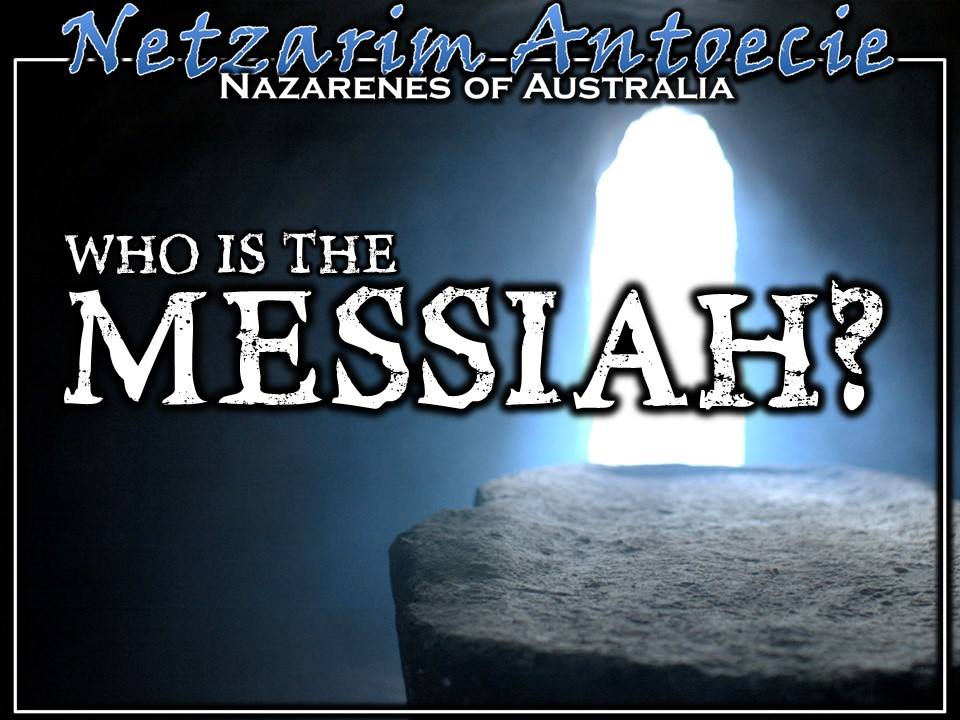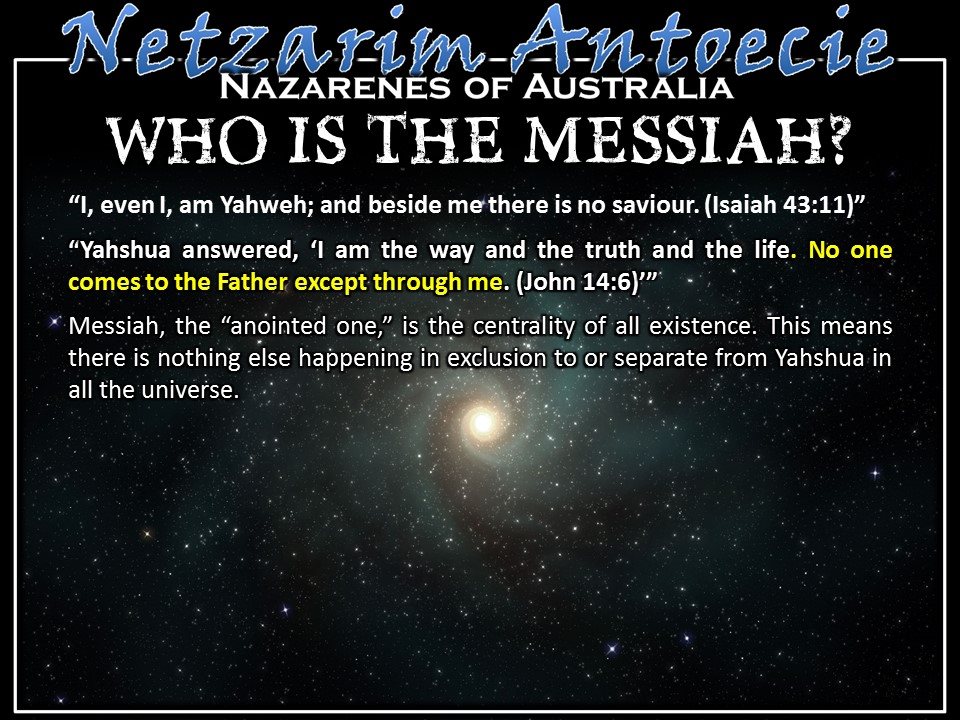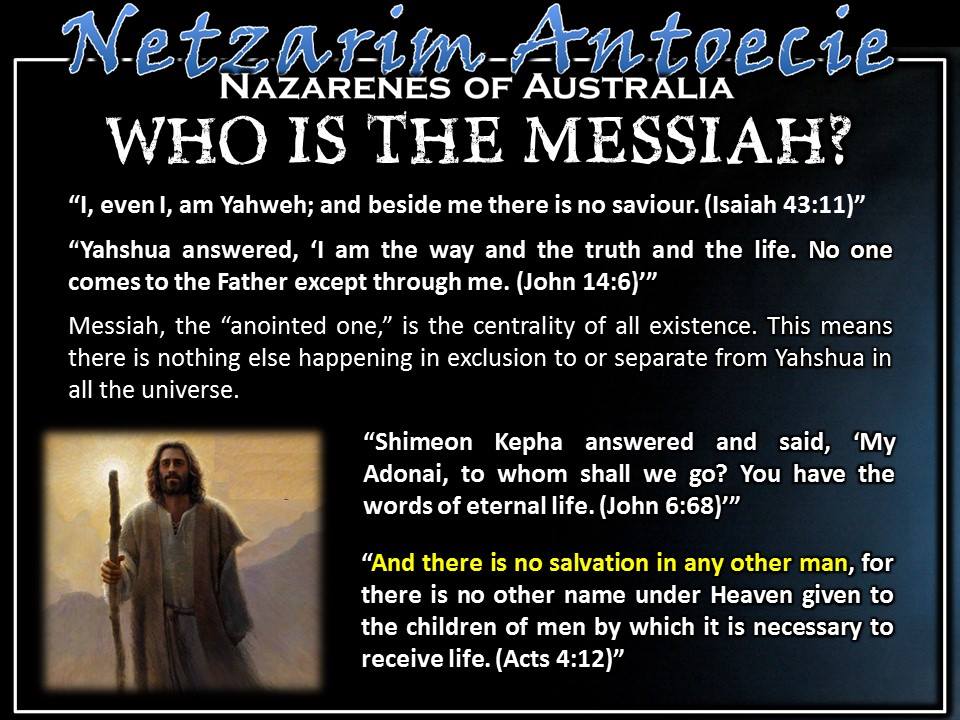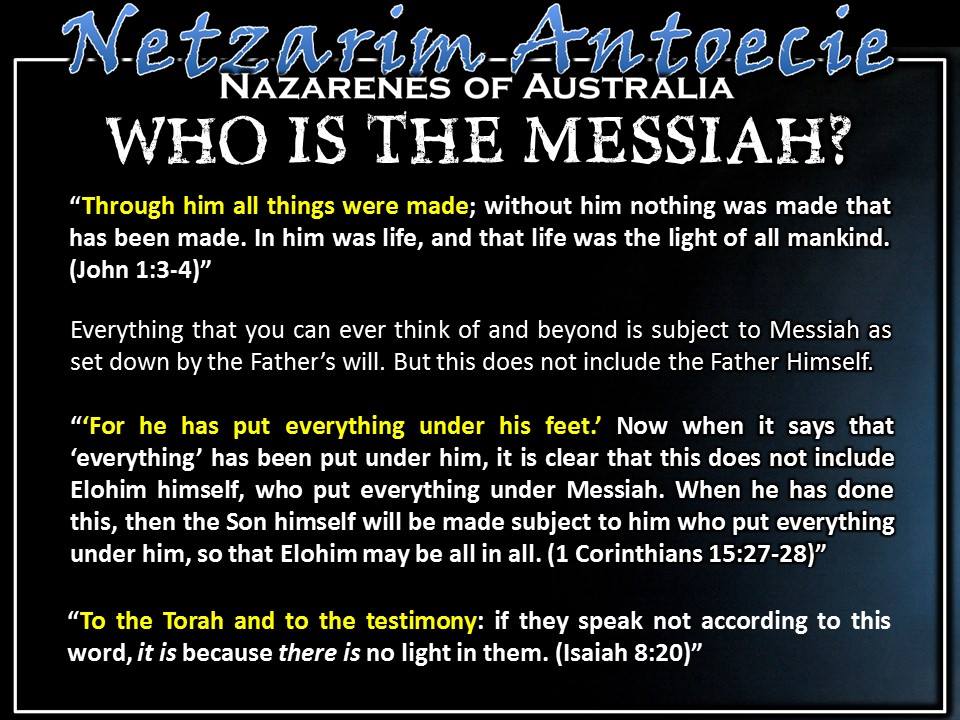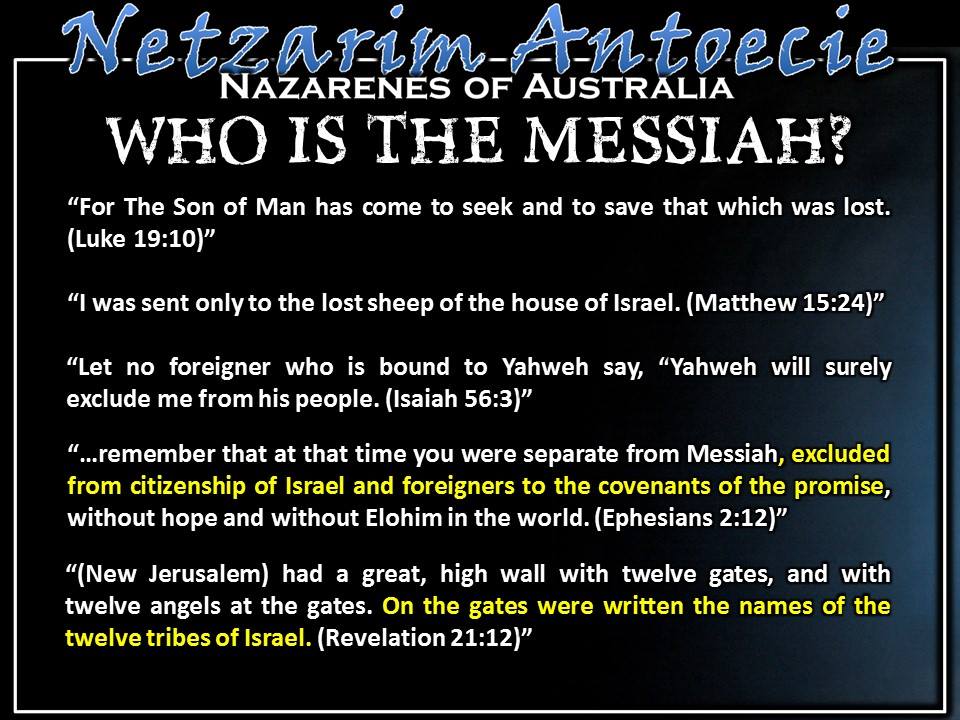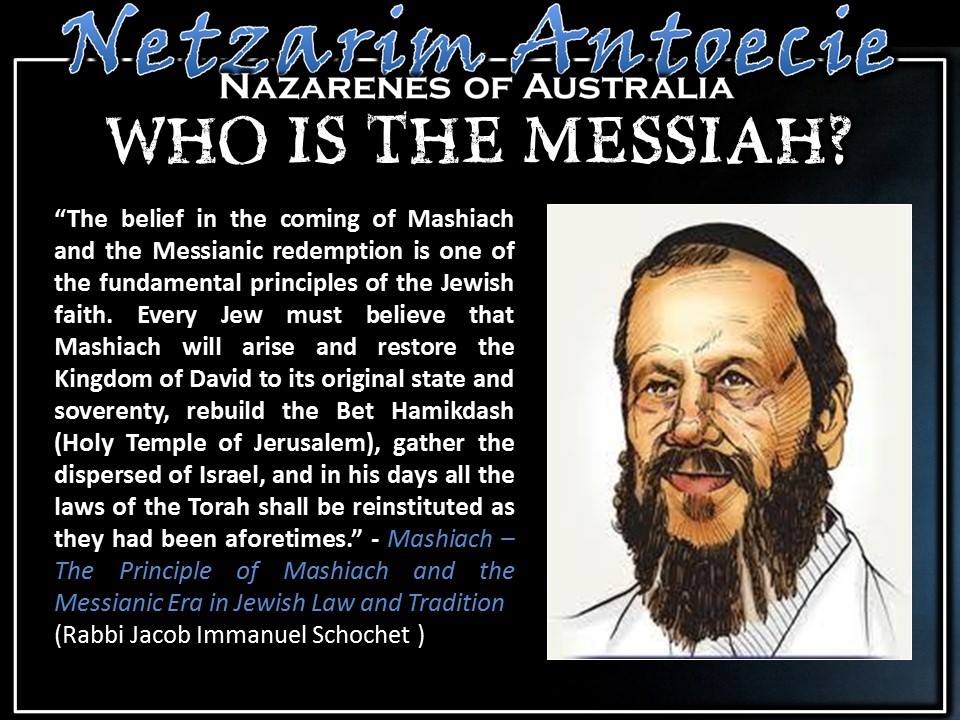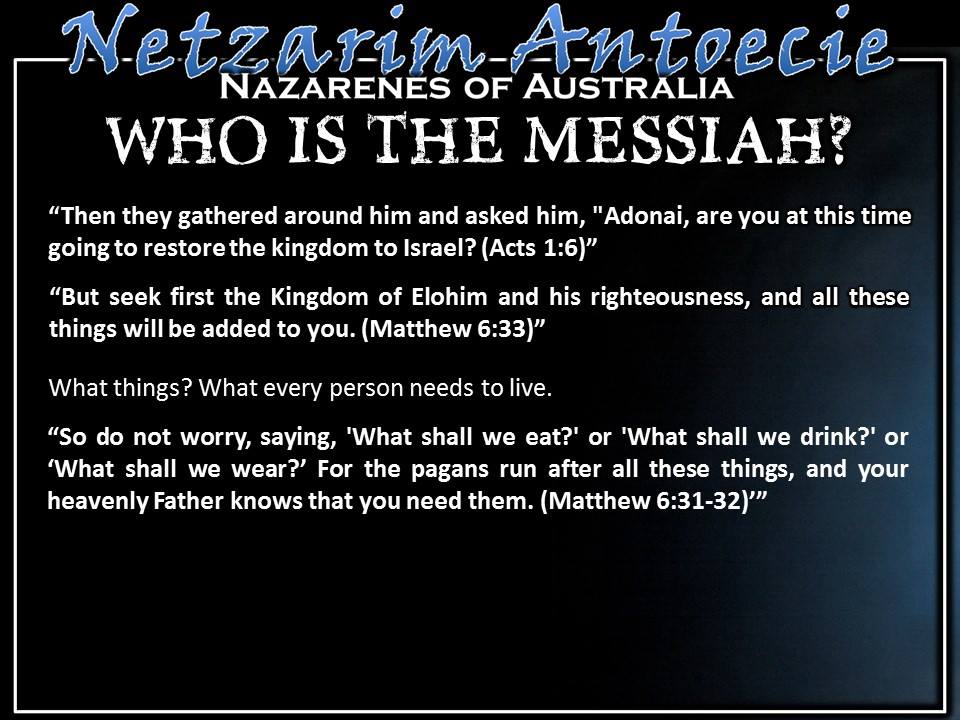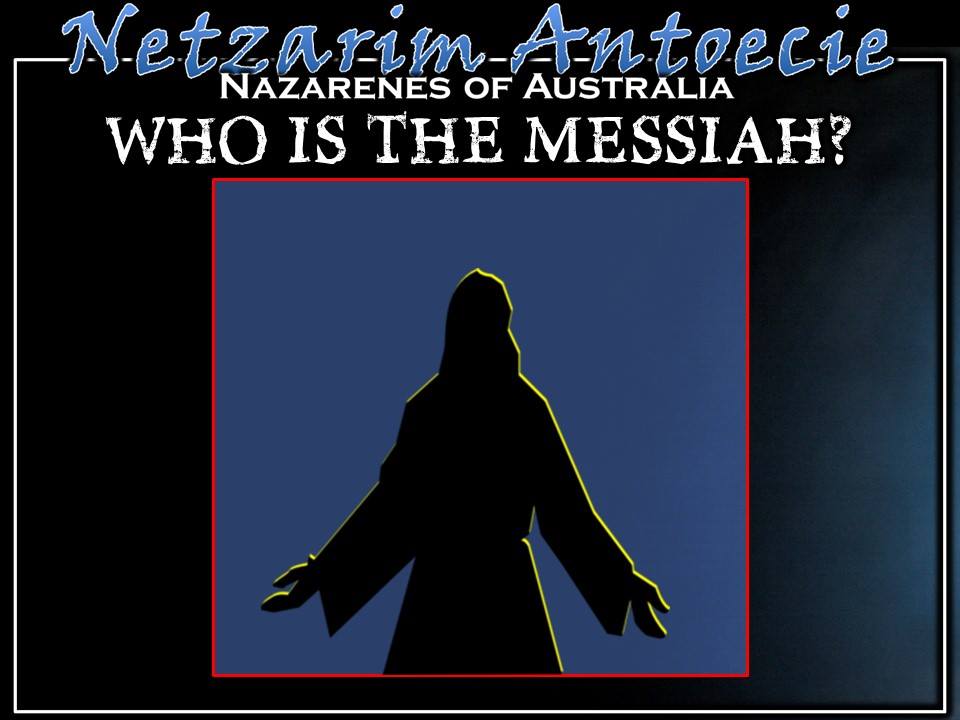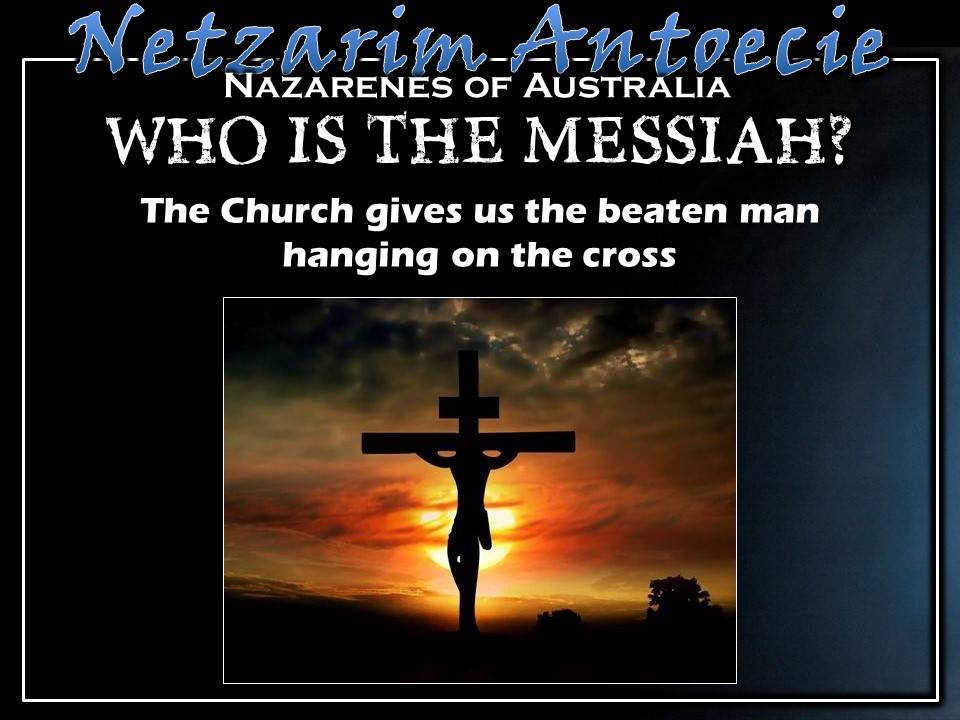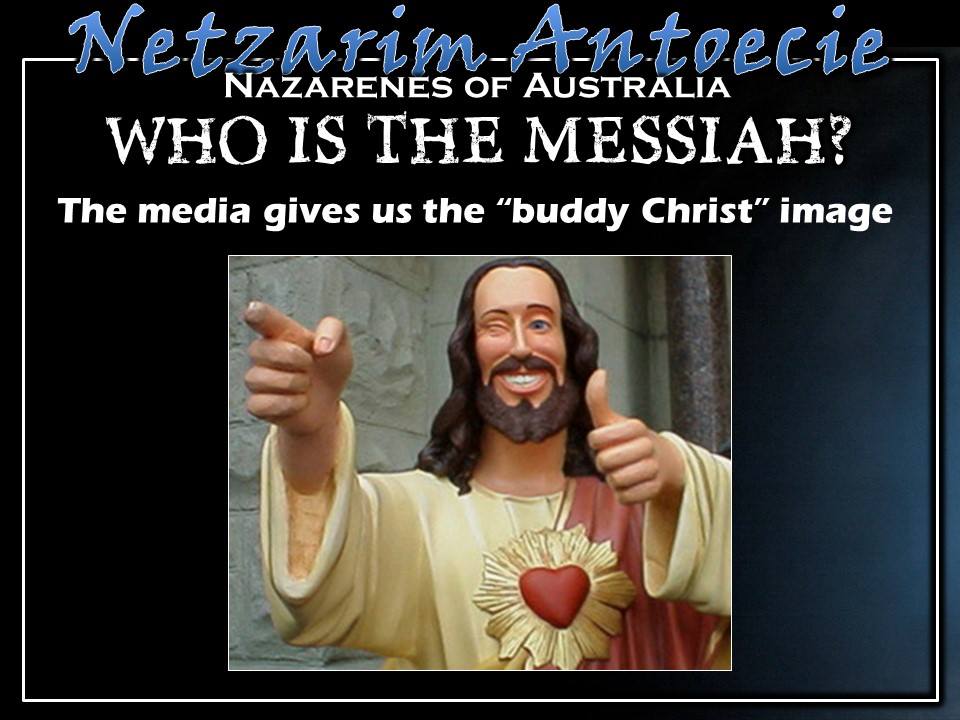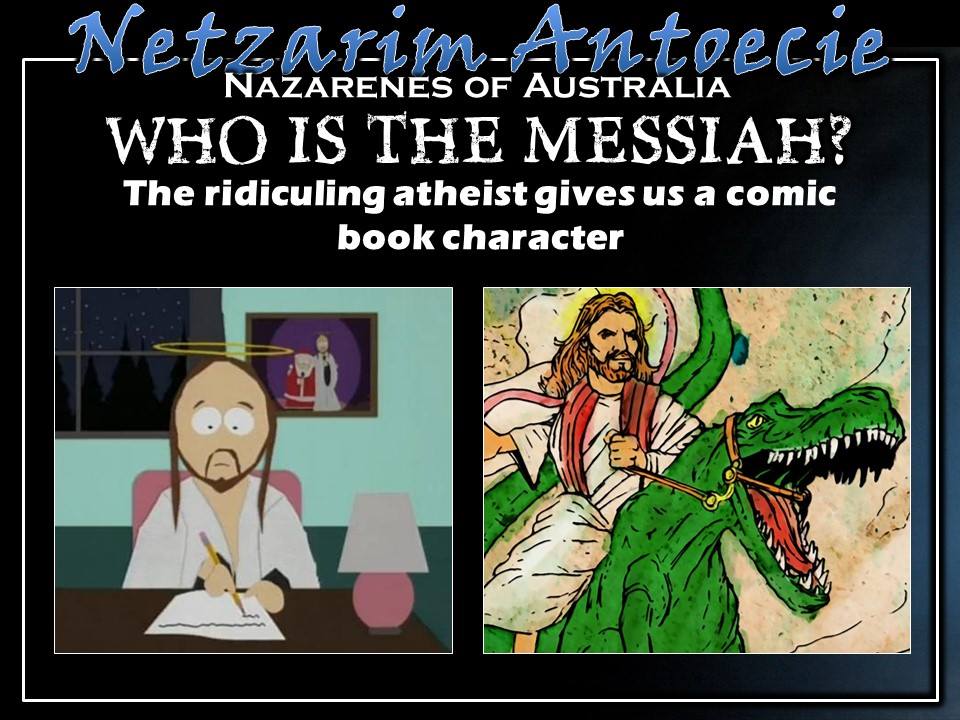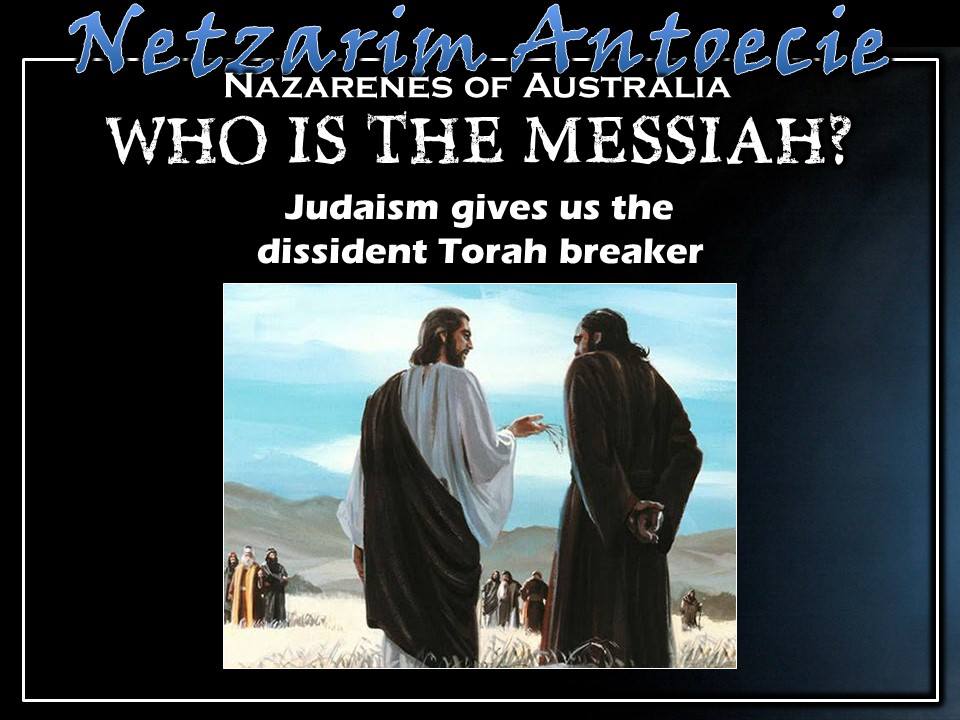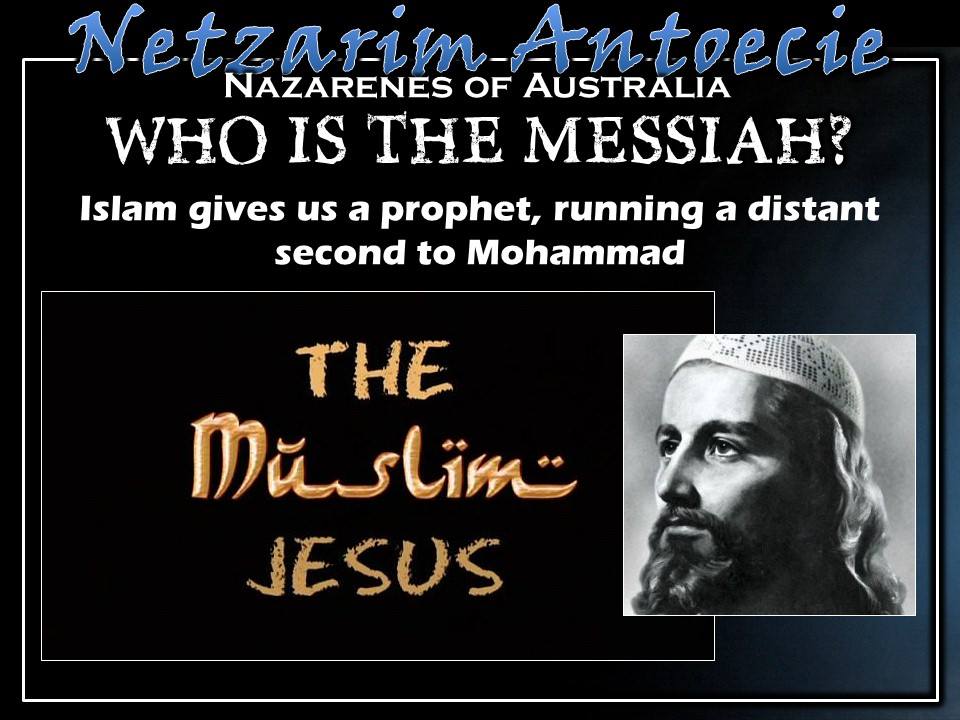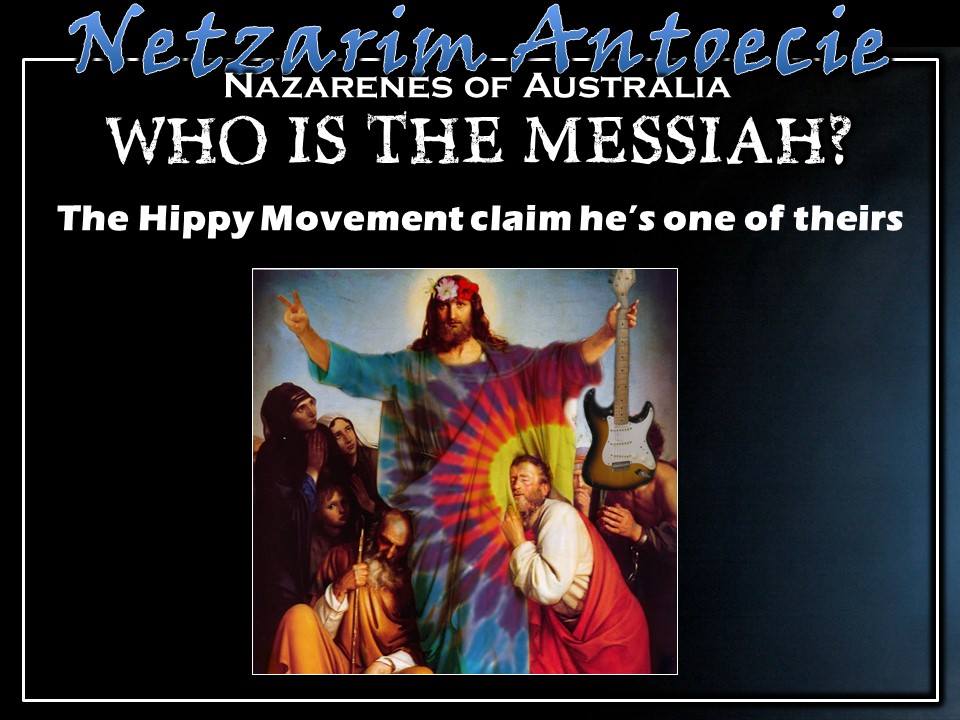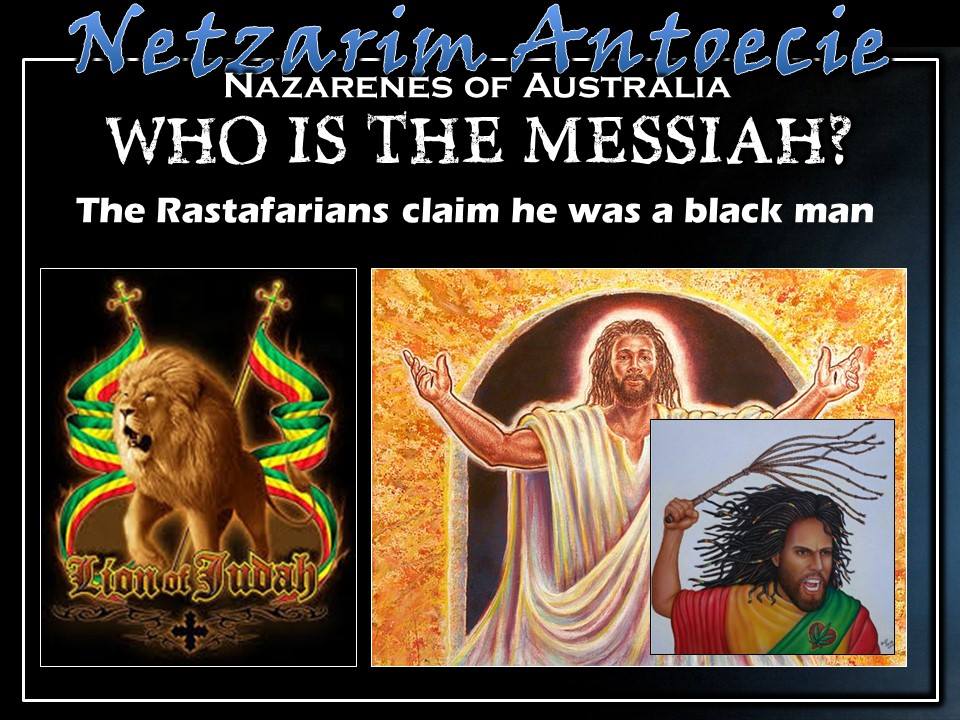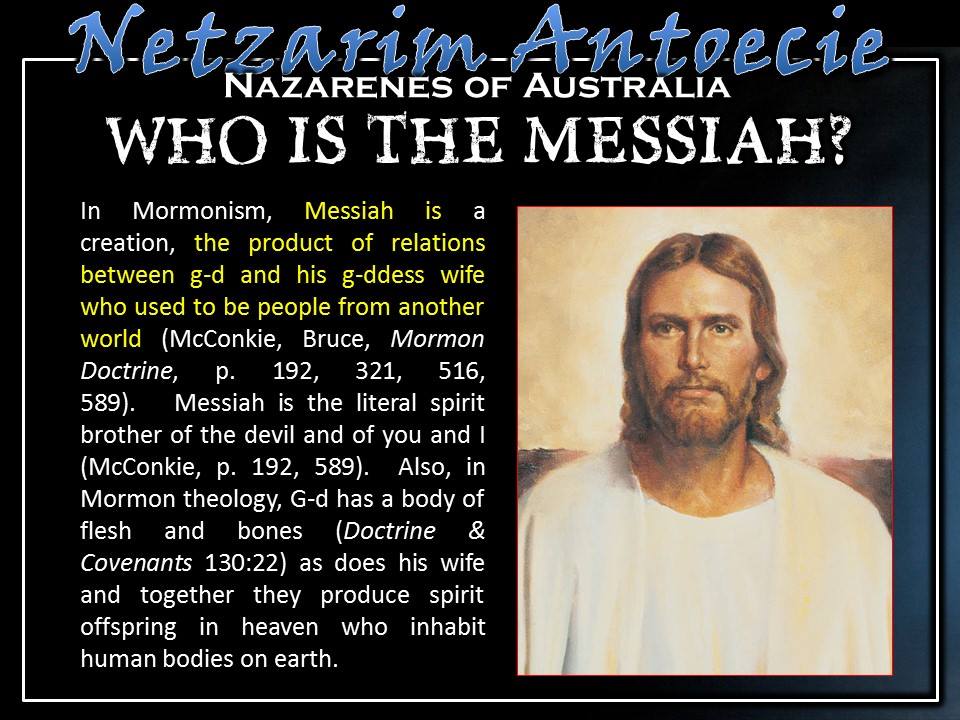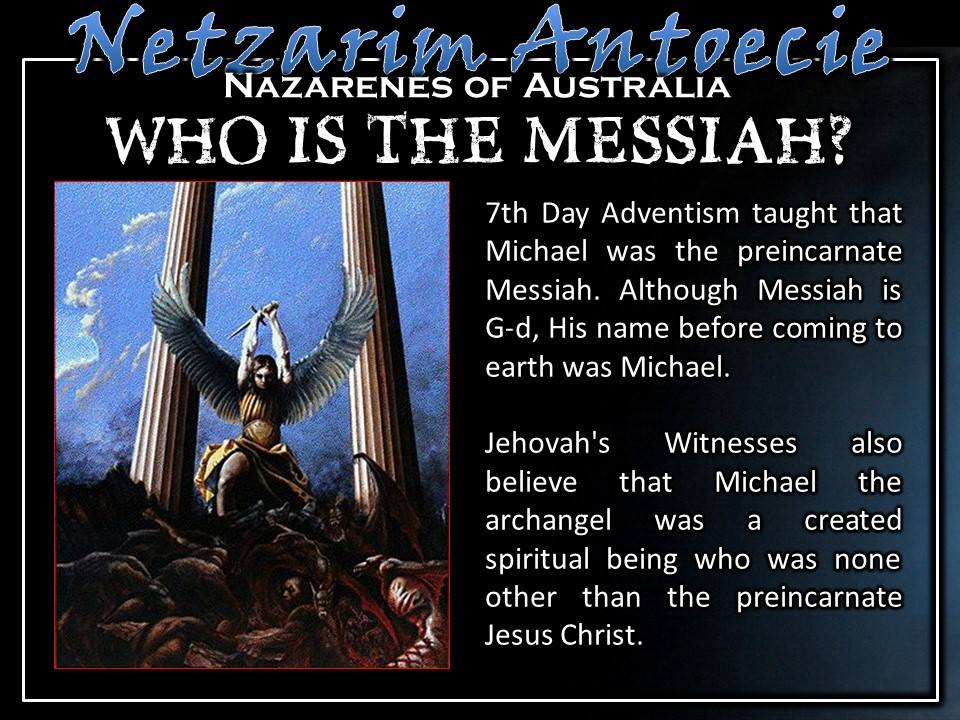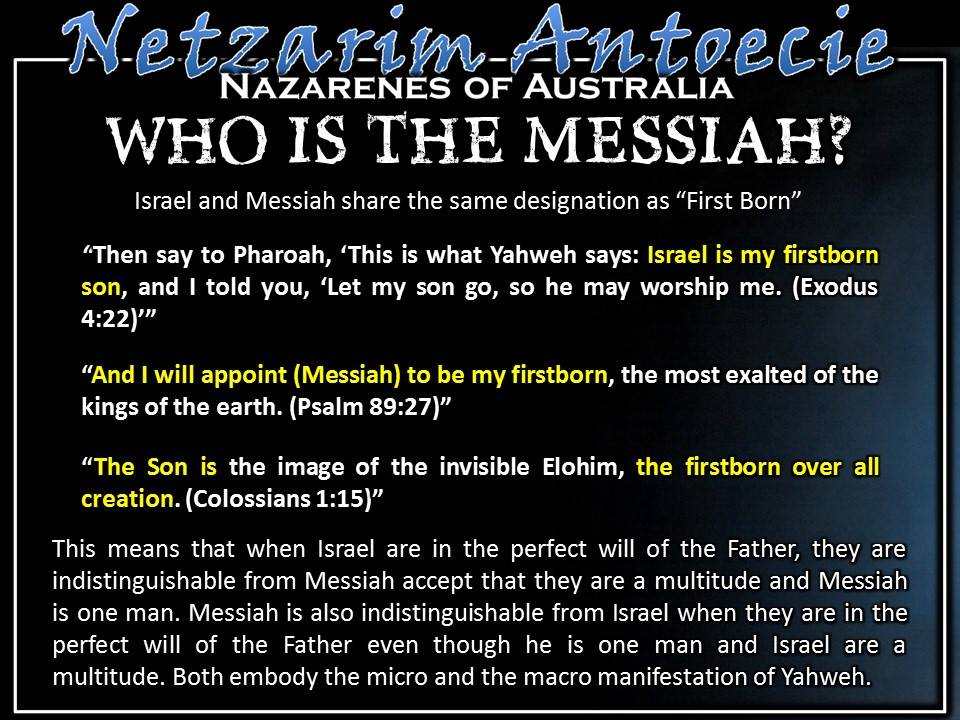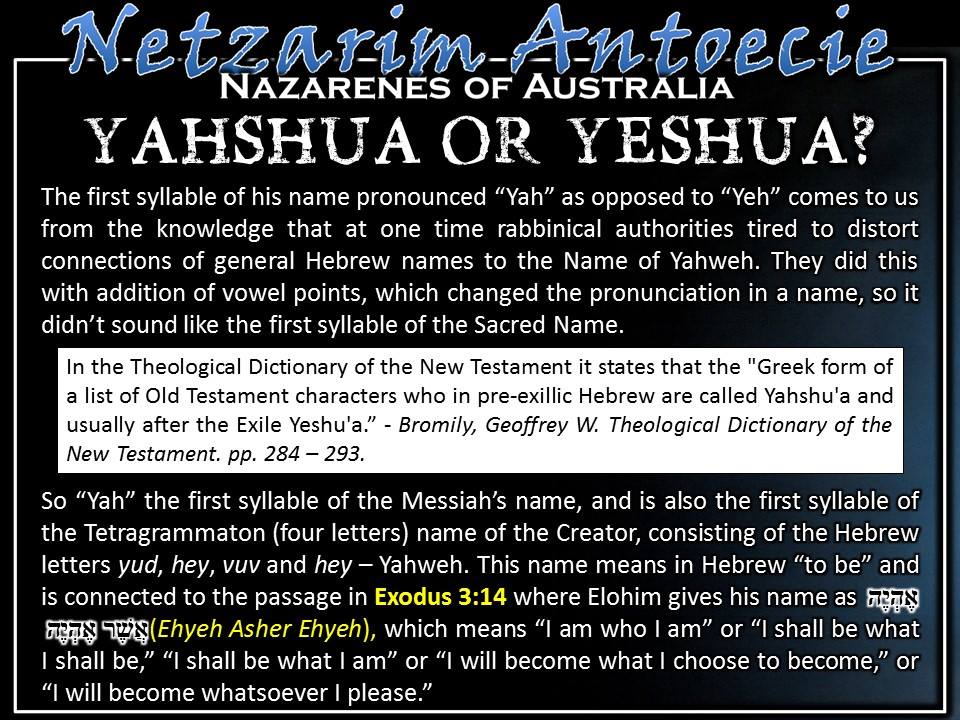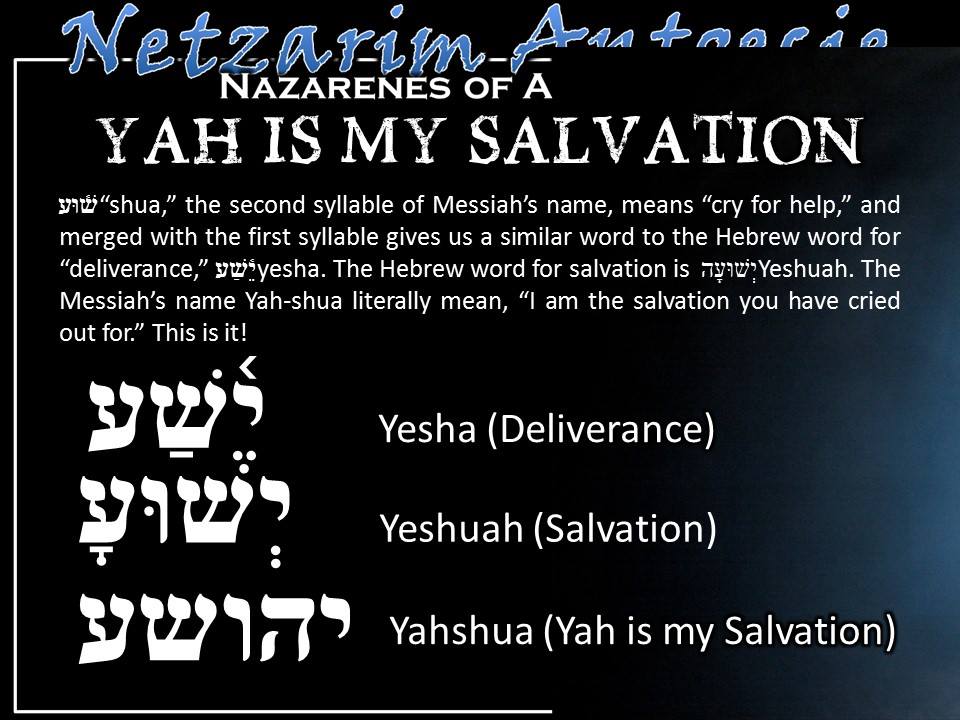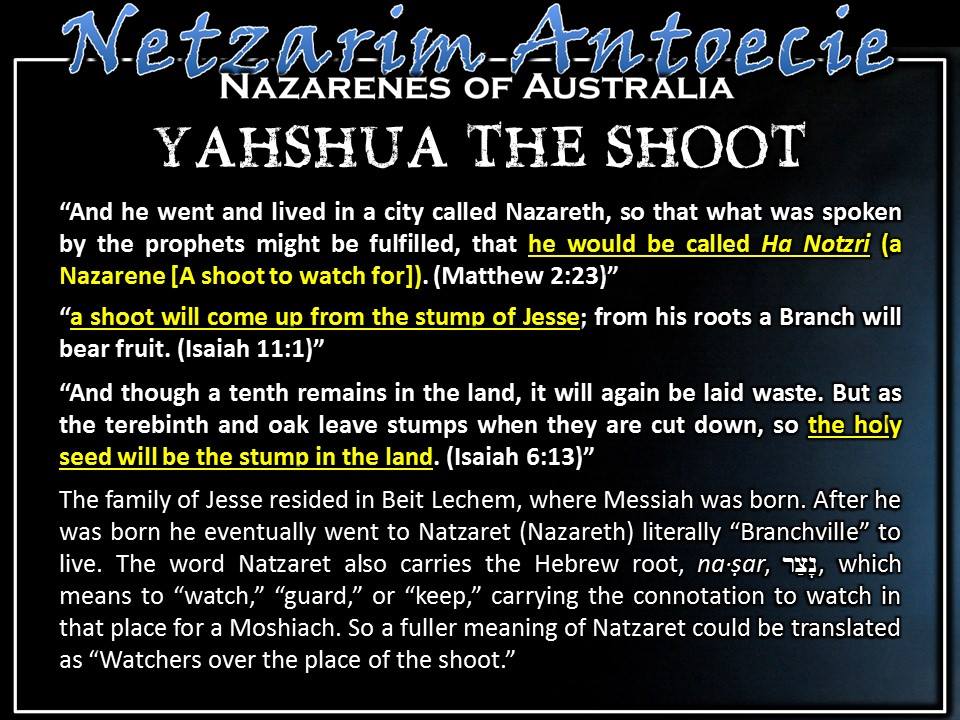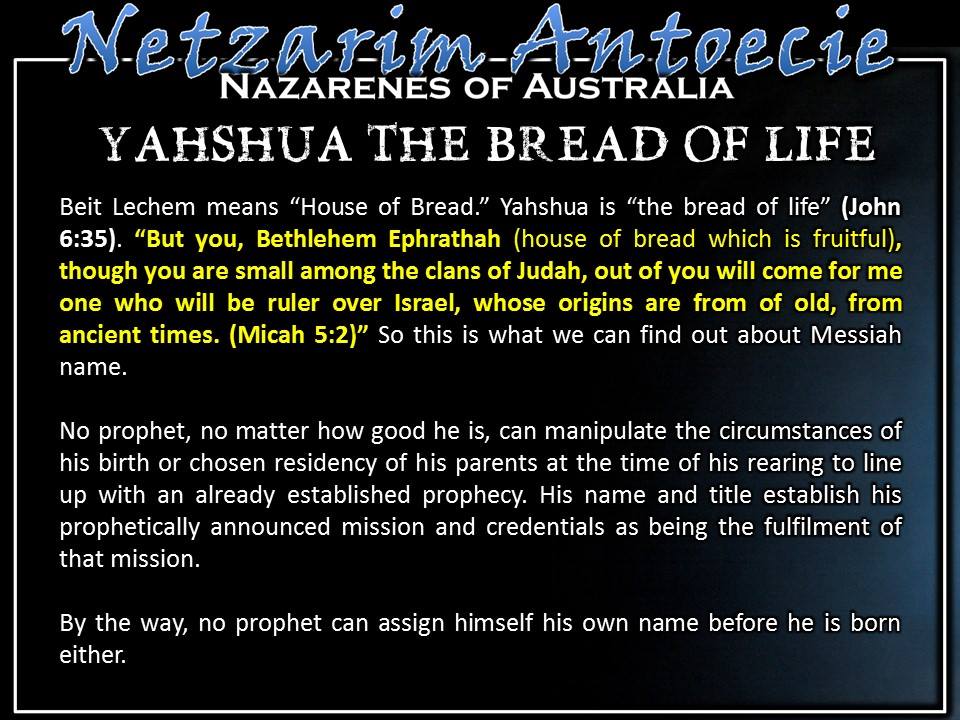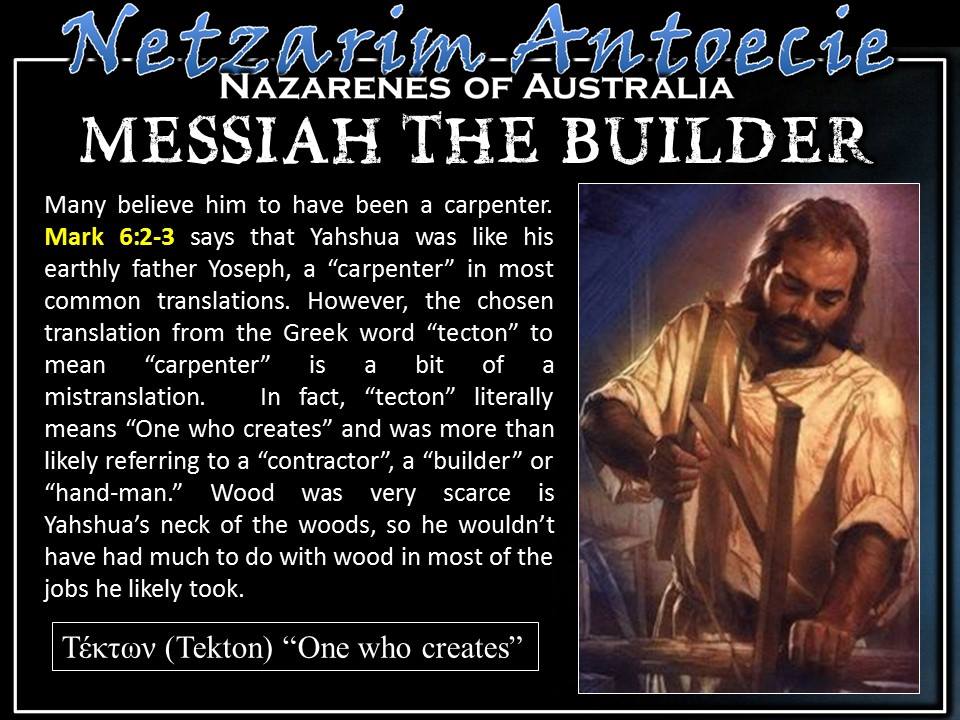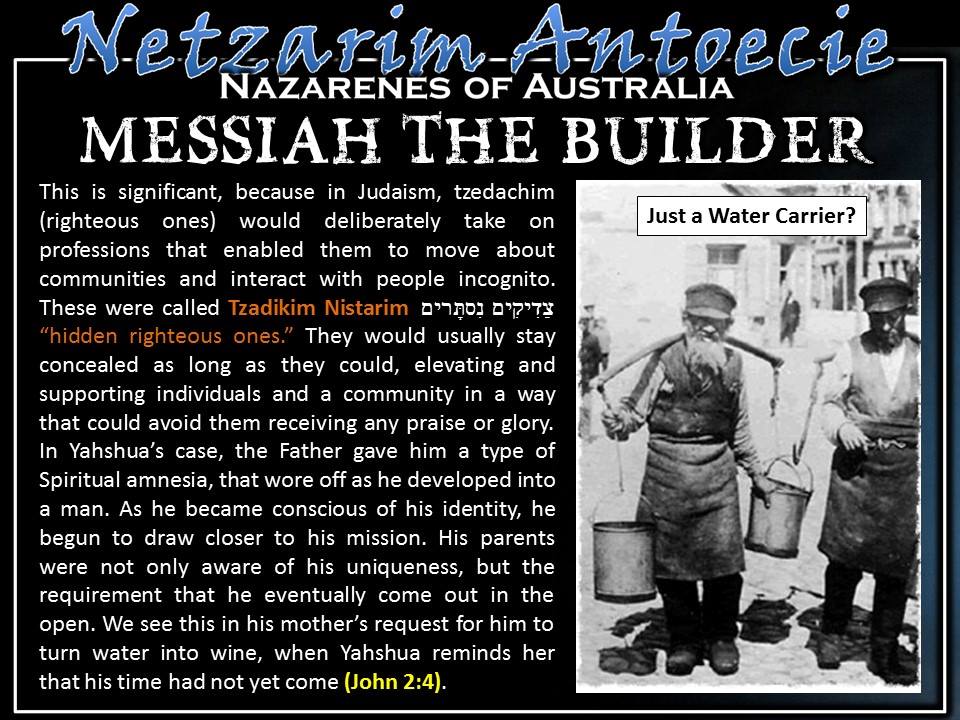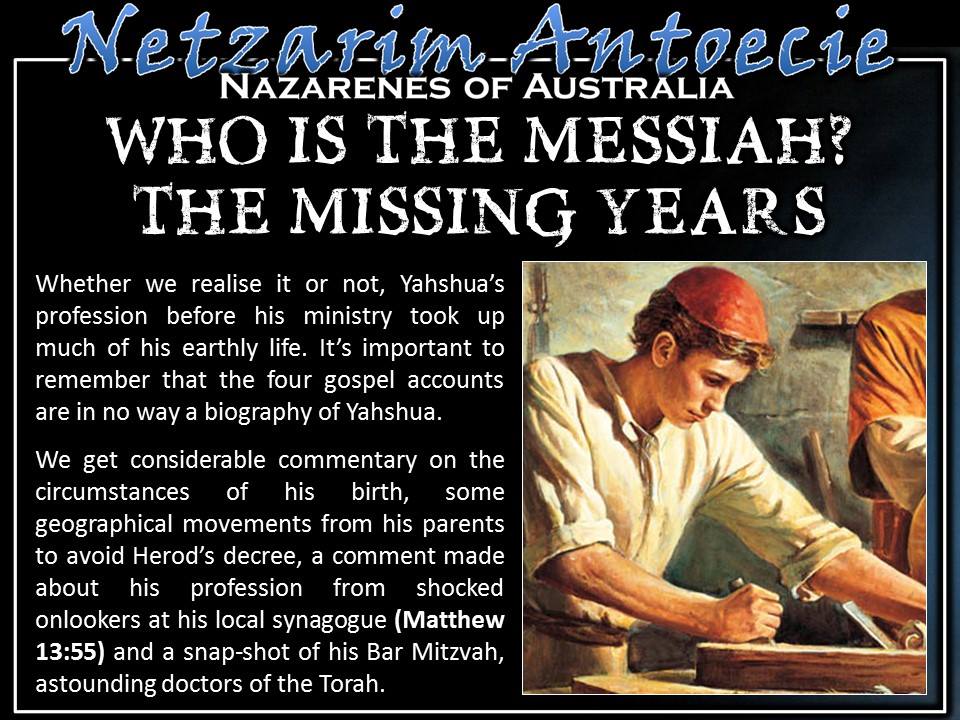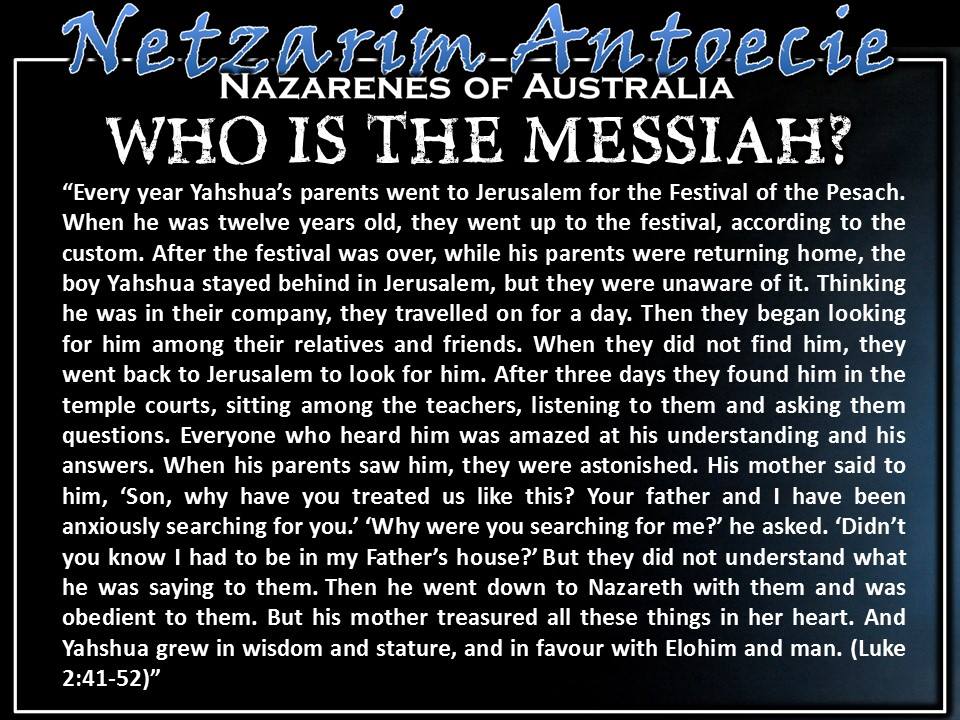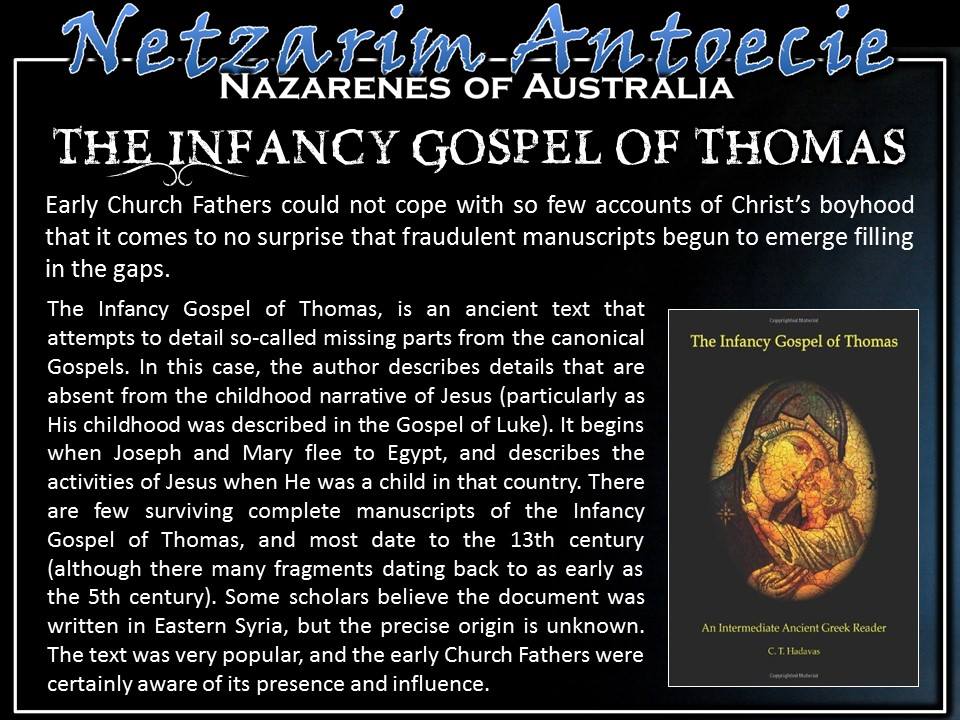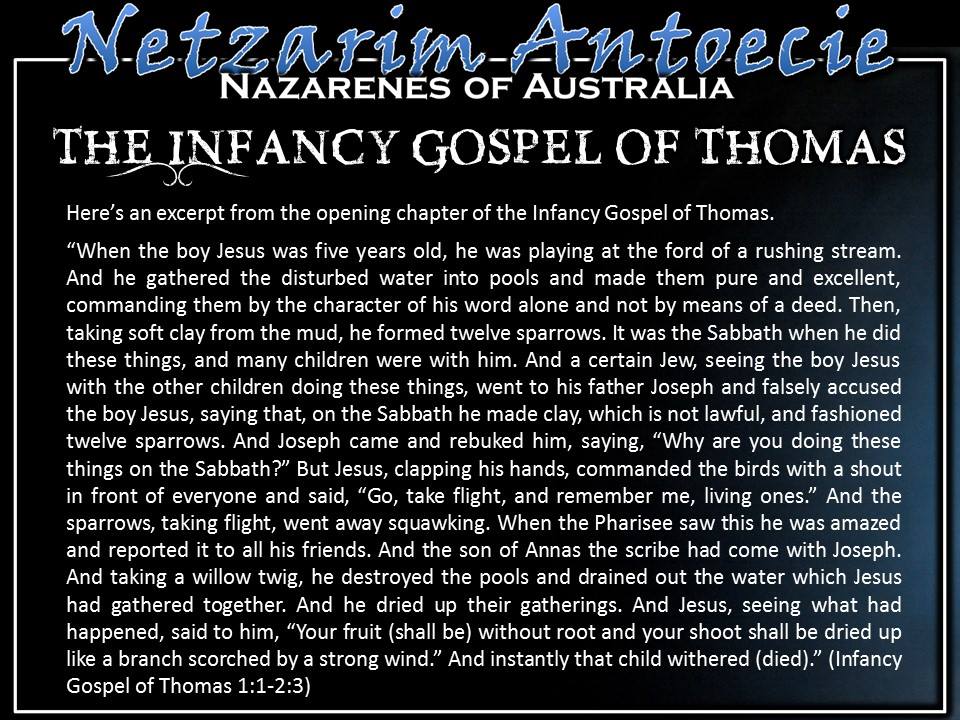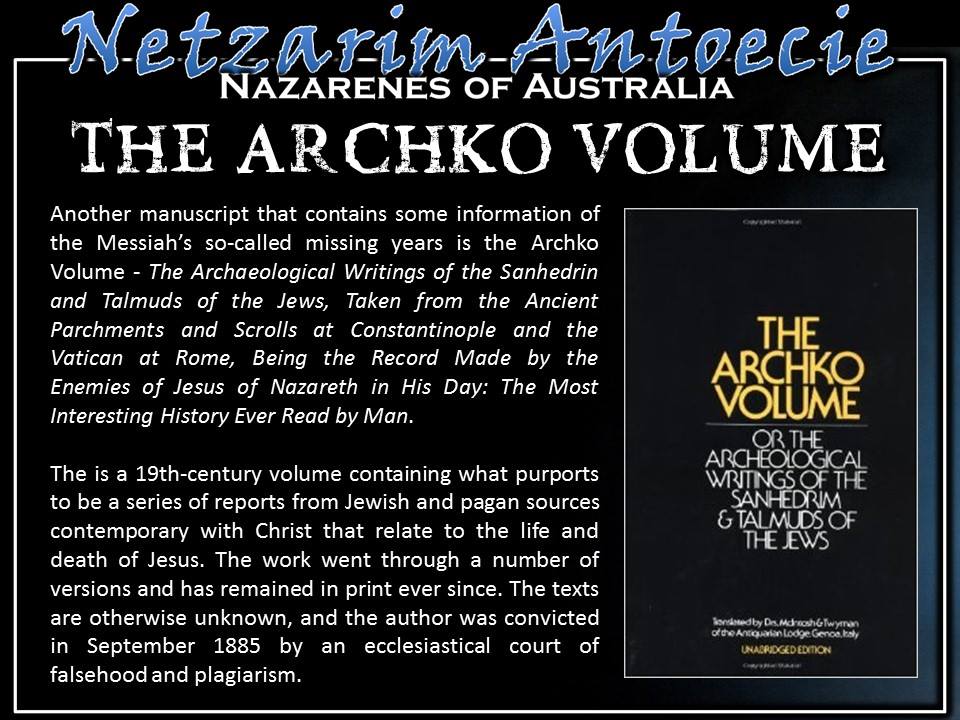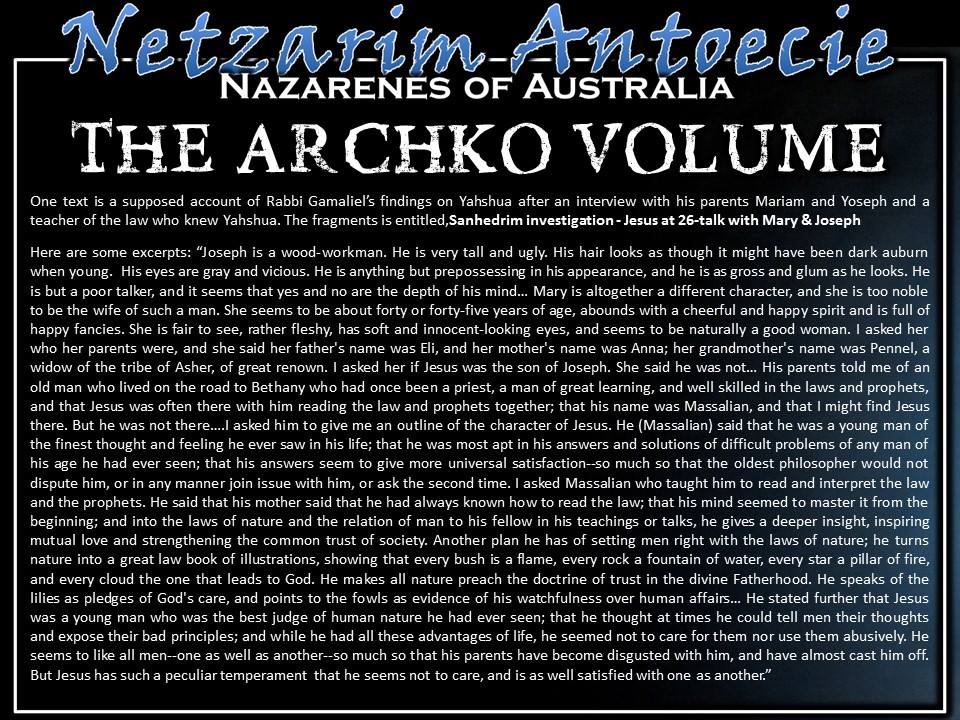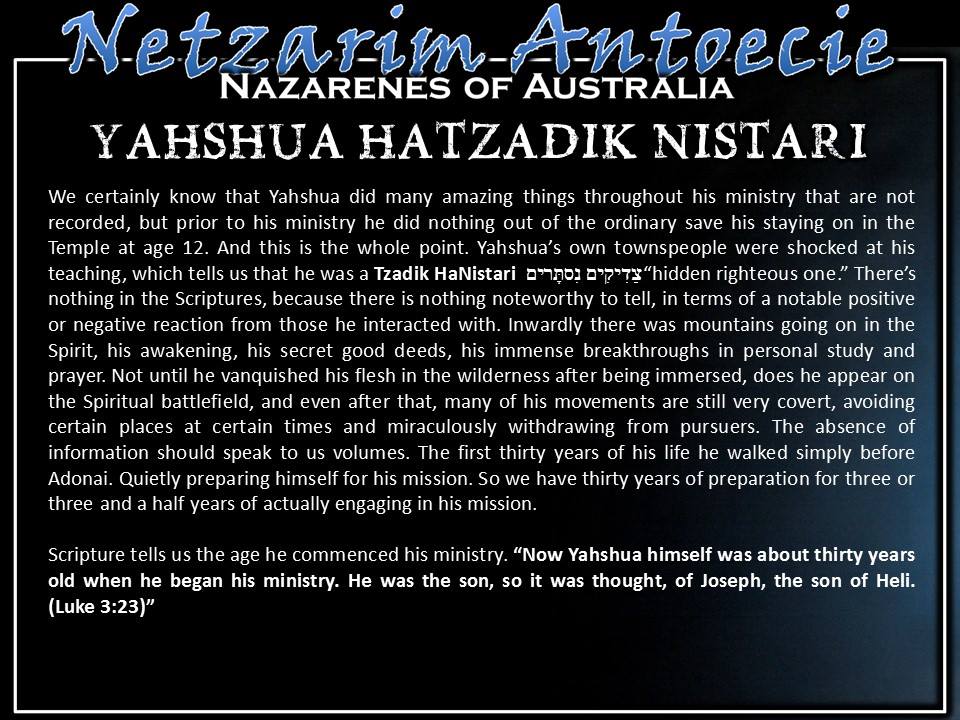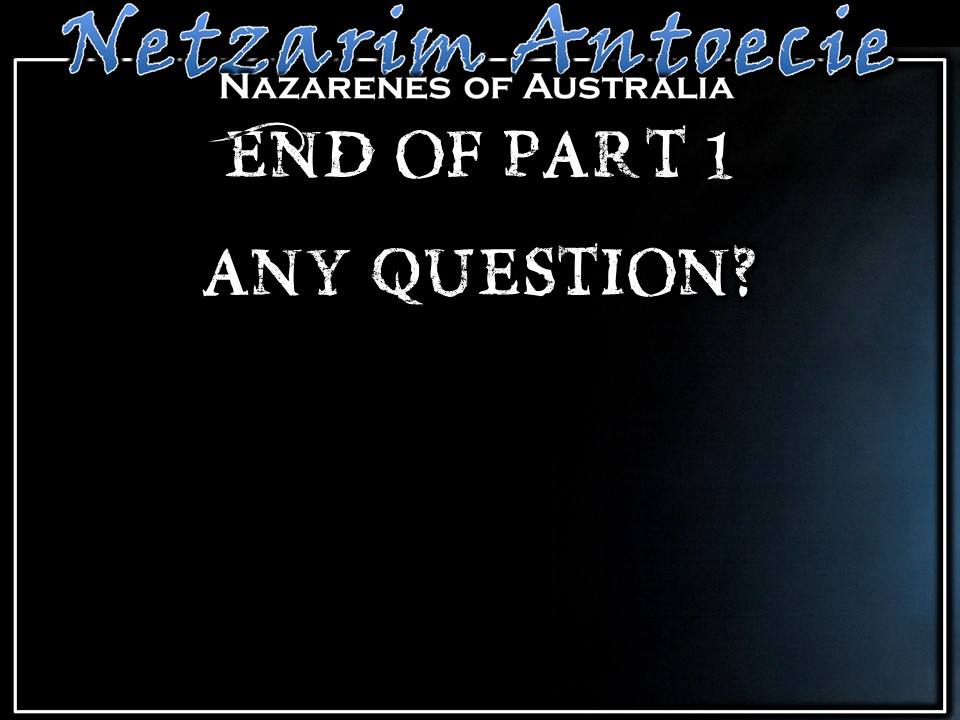Video Teaching
Slides
Study Notes
Who is the Messiah?
Introduction
“I, even I, am Yahweh; and beside me there is no saviour. (Isaiah 43:11)” “Yahshua answered, ‘I am the way and the truth and the life. No one comes to the Father except through me. (John 14:6)’” Messiah, the “anointed one,” is the centrality of all existence. This means there is nothing else happening in exclusion to or separate from Yahshua in all the universe. One of Messiah’s talmidim, Kepha, finds out this truth experientially in Capernaum, after receiving a particularly difficult teaching. Upon being asked by Yahshua if he and the rest of his closest students wished to depart, “Shimeon Kepha answered and said, ‘My Adonai, to whom shall we go? You have the words of eternal life. (John 6:68)’”
“And there is no salvation in any other man, for there is no other name under Heaven given to the children of men by which it is necessary to receive life. (Acts 4:12)”
“Through him all things were made; without him nothing was made that has been made. In him was life, and that life was the light of all mankind. (John 1:3-4)”
Everything that you can ever think of and beyond is subject to Messiah as set down by the Father’s will. But this does not include the Father Himself. “For he has put everything under his feet.’ Now when it says that ‘everything’ has been put under him, it is clear that this does not include Elohim himself, who put everything under Messiah. When he has done this, then the Son himself will be made subject to him who put everything under him, so that Elohim may be all in all. (1 Corinthians 15:27-28)”
Our perception of reality should not be what we think it is, but rather it is what Yahshua says it is, first in the Torah and then in the Testimony. “To the Torah and to the testimony: if they speak not according to this word, it is because there is no light in them. (Isaiah 8:20)” Both the Torah and the Testimony are one and the same. The Torah is laid down and the Son testifies to the Torah’s Truth.
At present in a small corner of the universe there is an ingathering of what was lost. “For The Son of Man has come to seek and to save that which was lost. (Luke 19:10)” “I was sent only to the lost sheep of the house of Israel. (Matthew 15:24)” This means Yahweh, the Creator, through His son Yahshua, is only saving Israel. If anyone considers themselves separated from Israel (in any way), they are removing themselves from the parameter of Yahweh’s boundary of deliverance. Isaiah warns of the mistake in making this distinction. “Let no foreigner who is bound to Yahweh say, “Yahweh will surely exclude me from his people. (Isaiah 56:3)” This is because there is no salvation outside the commonwealth of Israel. “…remember that at that time you were separate from Messiah, excluded from citizenship of Israel and foreigners to the covenants of the promise, without hope and without Elohim in the world. (Ephesians 2:12)” Yahweh started with Israel and he’ll be finishing with Israel. “For Yahweh will not reject his people; he will never forsake his inheritance. (Psalm 94:14)” “Elohim did not reject his people, whom he foreknew. (Romans 11:2)”
Consider the closing moments of deliverance in the Book of Revelation. “(New Jerusalem) had a great, high wall with twelve gates, and with twelve angels at the gates. On the gates were written the names of the twelve tribes of Israel. (Revelation 21:12)”
So this is why we bang on about Israel so much! Every believer needs to begin to identify with the national and cultural sovereignty of Israel. A true truth seeker cannot hope to get very far in his studies of the Scriptures without making a concerted effort in love to form an appreciation and a bond for Israel. This includes the land and its people, not only in their historical existence, but their present existence today. Until we take personal interest in Israel, its national welfare, its politics, its people, its geographic relevance and yes, even its people’s writings that fall outside the boundaries of canonised Scripture, we do ourselves a disservice in understanding Scripture in general. You can’t honestly say you want to find out about a place, a people or some historical event, but want to exclude the relevant culture climate and hope you’re going to be taken seriously. If you say you’re an avid student of the Bible and have no interest or knowledge about Jews or Judaism you are reading a different book.
The first principle of Judaism concerning Messiah in Rabbi Jacob Immanuel Schochet’s book Mashiach – The Principle of Mashiach and the Messianic Era in Jewish Law and Tradition, he writes, “The belief in the coming of Mashiach and the Messianic redemption is one of the fundamental principles of the Jewish faith. Every Jew must believe that mashiach will arise and restore the Kingdom of David to its original state and soverenty, rebuild the Bet Hamikdash (Holy Temple of Jerusalem), gather the dispersed of Israel, and in his days all the laws of the Torah shall be reinstituted as they had been aforetimes.”
This is important because Messiah’s restoration of the Kingdom occupied primary concern among his first talmidim. “Then they gathered around him and asked him, "Adonai, are you at this time going to restore the kingdom to Israel? (Acts 1:6)” In the mind of the Zealot, personal salvation took second place to communal salvation. The desire that righteousness would reign supreme throughout the universe was the utmost goal, not just one’s personal piece of righteousness off in some little corner of the universe. “But seek first the Kingdom of Elohim and his righteousness, and all these things will be added to you. (Matthew 6:33)” What things? What every person needs to live. “So do not worry, saying, 'What shall we eat?' or 'What shall we drink?' or ‘What shall we wear?’ For the pagans run after all these things, and your heavenly Father knows that you need them. (Matthew 6:31-32)’”
In recognising all this, we have to reacquaint ourselves with Messiah Yahshua. The world’s gone bonkers about who he is. The Messiah of Israel is the most well-known and yet the most misunderstood individual in all human history. This wouldn’t be much of a problem if his identity and mission had no bearing on a person’s eternal existence. But it does. It absolutely does. You want to hope that you’re philosophy on life hasn’t subconsciously come from some movie you saw back in 1973, or off the back of a box of cereal or even from a trying life event. A.B. Facey’s classic Australian book, A Fortunately Life isn’t such a fortunate life when at the end of it he concludes there is no G-d, based on all the carnage and horrors he saw in the war. No human experience, no matter how poor, is an excuse to cope out. Consider the Holocaust, the extermination of the only people at that time in history to be keeping Torah, never agreed on national disassociation of their Elohim, though according to the rational secularist mind, such a decision could be understood. Israel, has weathered the weight of storm after storm, without ever reverting to the ongoing victimised mentality that so many other disenfranchised races have continued to adopt. Do we have to be reminded that Israel, along with Messiah, is Yahweh’s first born? “Then say to Pharoah, ‘This is what Yahweh says: Israel is my firstborn son, and I told you, ‘Let my son go, so he may worship me. (Exodus 4:22)’”
If all Israel, in its prime condition, merged into a single person and stood erect, it would be completely indivisible from Messiah. So who is the Messiah?....Well, he’s not Jesus. Let’s start with his name.
Insights into Messiah’s Name
The Messiah’s earthly name is Yahshua ben Yoseph HaNotzri. In ancient times last names consisted of the Father’s first name and or the town of a person’s origin. While Yahshua was born in Beit Lechem (Bethlehem) in Judea, he eventually returned to his parents’ home of Natzaret (Nazareth) where he was raised. The town was aptly named, which I will discuss shortly.
His name carries some interesting characteristics.
The first syllable of his name pronounced “Yah” as opposed to “Yeh” comes to us from the knowledge that at one time rabbinical authorities tired to distort connections of general Hebrew names to the Name of Yahweh. They did this with addition of vowel points, which changed the pronunciation in a name, so it didn’t sound like the first syllable of the Sacred Name.
In the Theological Dictionary of the New Testament it states that the "Greek form of a list of Old Testament characters who in pre-exillic Hebrew are called Yahshu'a and usually after the Exile Yeshu'a.” - Bromily, Geoffrey W. Theological Dictionary of the New Testament. pp. 284 – 293.
So “Yah” the first syllable of the Messiah’s name, and is also the first syllable of the Tetragrammaton (four letters) name of the Creator, consisting of the Hebrew letters yud, hey, vuv and hey – Yahweh. This name means in Hebrew “to be” and is connected to the passage in Exodus 3:14 where Elohim gives his name as אֶהְיֶה אֲשֶׁר אֶהְיֶה (Ehyeh Asher Ehyeh), which means “I am who I am” or “I shall be what I shall be,” “I shall be what I am” or “I will become what I choose to become,” or “I will become whatsoever I please.”
שׁ֫וּע “shua,” the second syllable of Messiah’s name, means “cry for help,” and merged with the first syllable gives us a similar word to the Hebrew word for “deliverance,” יֵ֫שַׁע yesha. The Hebrew word for salvation is יְשׁוּעָה Yeshuah. The Messiah’s name Yah-shua literally mean, “I am the salvation you have cried out for.” This is it!
Yahshua’s title, HaNotzri, is very interesting and tells us more. “And he went and lived in a city called Nazareth, so that what was spoken by the prophets might be fulfilled, that he would be called Ha Notzri. (Matthew 2:23)”
The name Yahshua the Branch (or “Shoot”) means, to the trained ear, “This is Yah’s salvation that has emerged from the remains of the severed linage of Jesse.” In other words, “Yahshua is the sprouting hope of a ruined people” So how do we get these meanings? Again, the Prophet Isaiah tells us, using metaphorical language, that “a shoot will come up from the stump of Jesse; from his roots a Branch will bear fruit. (Isaiah 11:1)” So why had Jesse become a stump? A tree is usually used to symbolise family. Ever heard of a family tree? A stump isn’t a good example of a flourishing family tree. What happened? Through disobedience, Yahweh reduced Israel to a wasteland of cut down trees (deceased families). “And though a tenth remains in the land, it will again be laid waste. But as the terebinth and oak leave stumps when they are cut down, so the holy seed will be the stump in the land. (Isaiah 6:13)” Which land? Israel! We can be more specific. Within Israel existed the family of Jesse. The family of Jesse resided in Beit Lechem, where Messiah was born. After he was born he eventually went to Natzaret (Nazareth) literally “Branchville” to live. The word Natzaret also carries the Hebrew root, na·ṣar, נָצַר, which means to “watch,” “guard,” or “keep,” carrying the connotation to watch in that place for a Moshiach. So a fuller meaning of Natzaret could be translated as “Watchers over the place of the shoot.” The geographic names of these places are markers fulfilling Biblical prophecy.
Beit Lechem means “House of Bread.” Yahshua is “the bread of life” (John 6:35). “But you, Bethlehem Ephrathah (house of bread which is fruitful), though you are small among the clans of Judah, out of you will come for me one who will be ruler over Israel, whose origins are from of old, from ancient times. (Micah 5:2)” So this is what we can find out about Messiah name. No prophet, no matter how good he is, can manipulate the circumstances of his birth or chosen residency of his parents at the time of his rearing to line up with an already established prophecy. His name and title establish his prophetically announced mission and credentials as being the fulfilment of that mission.
Was Messiah a Carpenter?
Next up is Messiah’s profession before his ministry. Many believe him to have been a carpenter. Mark 6:2-3 says that Yahshua was like his earthly father Yoseph, a “carpenter” in most common translations. However, the chosen translation from the Greek word “tecton” to mean “carpenter” is a bit of a mistranslation. In fact, tecton literally means “One who creates” and was more than likely referring to a “contractor”, a “builder” or “hand-man.” Wood was very scarce is Yahshua’s neck of the woods, so he wouldn’t have had much to do with wood in most of the jobs he likely took.
This is significant, because in Judaism, tzedachim (righteous ones) would deliberately take on professions that enabled them to move about communities and interact with people incognito. These were called Tzadikim Nistarim צַדִיקִים נִסתָּרים “hidden righteous ones.” They would usually stay concealed as long as they could, elevating and supporting individuals and a community in a way that could avoid them receiving any praise or glory. In Yahshua’s case, the Father gave him a type of Spiritual amnesia, that wore off as he developed into a man. As he became conscious of his identity, he begun to draw closer to his mission. His parents were not only aware of his uniqueness, but the requirement that he eventually come out into the open. We see this in his mother’s request for him to turn water into wine, when Yahshua reminds her that his time had not yet come (John 2:4).
Whether we realise it or not, Yahshua’s profession before his ministry took up much of his earthly life. It’s important to remember that the four gospel accounts are in no way a biography of Yahshua’s life. We get considerable commentary on the circumstances of his birth, some geographical movements from his parents to avoid Herod’s decree, a comment made about his profession from shocked onlookers at his local synagogue (Matthew 13:55) and a snap-shot of his Bar Mitzvah, astounding doctors of the Torah. “Every year Yahshua’s parents went to Jerusalem for the Festival of the Pesach. When he was twelve years old, they went up to the festival, according to the custom. After the festival was over, while his parents were returning home, the boy Yahshua stayed behind in Jerusalem, but they were unaware of it. Thinking he was in their company, they travelled on for a day. Then they began looking for him among their relatives and friends. When they did not find him, they went back to Jerusalem to look for him. After three days they found him in the temple courts, sitting among the teachers, listening to them and asking them questions. Everyone who heard him was amazed at his understanding and his answers. When his parents saw him, they were astonished. His mother said to him, ‘Son, why have you treated us like this? Your father and I have been anxiously searching for you.’ ‘Why were you searching for me?’ he asked. ‘Didn’t you know I had to be in my Father’s house?’ But they did not understand what he was saying to them. Then he went down to Nazareth with them and was obedient to them. But his mother treasured all these things in her heart. And Yahshua grew in wisdom and stature, and in favour with Elohim and man. (Luke 2:41-52)”
Early Church Fathers could not cope with so few accounts of Christ’s boyhood that it comes to no surprise that fraudulent manuscripts begun to emerge filling in the gaps.
The Infancy Gospel of Thomas, is an ancient text that attempts to detail so-called missing parts from the canonical Gospels. In this case, the author describes details that are absent from the childhood narrative of Jesus (particularly as His childhood was described in the Gospel of Luke). It begins when Joseph and Mary flee to Egypt, and describes the activities of Jesus when He was a child in that country. There are few surviving complete manuscripts of the Infancy Gospel of Thomas, and most date to the 13th century (although there many fragments dating back to as early as the 5th century). Some scholars believe the document was written in Eastern Syria, but the precise origin is unknown. The text was very popular, and the early Church Fathers were certainly aware of its presence and influence.
Here’s an excerpt from the opening chapter of the Infancy Gospel of Thomas.
“When the boy Jesus was five years old, he was playing at the ford of a rushing stream. And he gathered the disturbed water into pools and made them pure and excellent, commanding them by the character of his word alone and not by means of a deed. Then, taking soft clay from the mud, he formed twelve sparrows. It was the Sabbath when he did these things, and many children were with him. And a certain Jew, seeing the boy Jesus with the other children doing these things, went to his father Joseph and falsely accused the boy Jesus, saying that, on the Sabbath he made clay, which is not lawful, and fashioned twelve sparrows. And Joseph came and rebuked him, saying, “Why are you doing these things on the Sabbath?” But Jesus, clapping his hands, commanded the birds with a shout in front of everyone and said, “Go, take flight, and remember me, living ones.” And the sparrows, taking flight, went away squawking. When the Pharisee saw this he was amazed and reported it to all his friends. And the son of Annas the scribe had come with Joseph. And taking a willow twig, he destroyed the pools and drained out the water which Jesus had gathered together. And he dried up their gatherings. And Jesus, seeing what had happened, said to him, “Your fruit (shall be) without root and your shoot shall be dried up like a branch scorched by a strong wind.” And instantly that child withered (died).” (Infancy Gospel of Thomas 1:1-2:3)
Portions of the Infancy Gospel of Thomas claim “Thomas the Israelite” is the author, but this material appears to be a late addition and it is uncertain if it is referring to the Apostle Thomas. In any case, the document simply cannot have been written by the Apostle, given its late authorship and unfamiliarity with Jewish life and customs of the 1st Century. The text presupposes the Gospel of Luke and must, therefore, have been written after Luke’s text was distributed and well known; the author is dependent upon Luke for his information related to the life of Jesus, the Sabbath and the Passover. In addition, the text describes Jesus as a brilliant child, performing a number of miracles in Nazareth, completely contradicting the portrayal of the Nazoraeans as described in Luke Chapter 4. Luke describes the natives of Nazareth responding in shock to Jesus’ initial messianic teaching, seemingly unfamiliar that Jesus was anything more than a poor carpenter’s son.
Another manuscript that contains some information of the Messiah’s so-called missing years is the Arko Volume - The Archaeological Writings of the Sanhedrin and Talmuds of the Jews, Taken from the Ancient Parchments and Scrolls at Constantinople and the Vatican at Rome, Being the Record Made by the Enemies of Jesus of Nazareth in His Day: The Most Interesting History Ever Read by Man.
The is a 19th-century volume containing what purports to be a series of reports from Jewish and pagan sources contemporary with Christ that relate to the life and death of Jesus. The work went through a number of versions and has remained in print ever since. The texts are otherwise unknown, and the author was convicted in September 1885 by an ecclesiastical court of falsehood and plagiarism.
One text is a supposed account of Rabbi Gamaliel’s findings on Yahshua after an interview with his parents Mariam and Yoseph and a teacher of the law who knew Yahshua. The fragments is entitled,Sanhedrim investigation - Jesus at 26-talk with Mary & Joseph
Here are some excerpts: “Joseph is a wood-workman. He is very tall and ugly. His hair looks as though it might have been dark auburn when young. His eyes are gray and vicious. He is anything but prepossessing in his appearance, and he is as gross and glum as he looks. He is but a poor talker, and it seems that yes and no are the depth of his mind… Mary is altogether a different character, and she is too noble to be the wife of such a man. She seems to be about forty or forty-five years of age, abounds with a cheerful and happy spirit and is full of happy fancies. She is fair to see, rather fleshy, has soft and innocent-looking eyes, and seems to be naturally a good woman. I asked her who her parents were, and she said her father's name was Eli, and her mother's name was Anna; her grandmother's name was Pennel, a widow of the tribe of Asher, of great renown. I asked her if Jesus was the son of Joseph. She said he was not… His parents told me of an old man who lived on the road to Bethany who had once been a priest, a man of great learning, and well skilled in the laws and prophets, and that Jesus was often there with him reading the law and prophets together; that his name was Massalian, and that I might find Jesus there. But he was not there….I asked him to give me an outline of the character of Jesus. He (Massalian) said that he was a young man of the finest thought and feeling he ever saw in his life; that he was most apt in his answers and solutions of difficult problems of any man of his age he had ever seen; that his answers seem to give more universal satisfaction--so much so that the oldest philosopher would not dispute him, or in any manner join issue with him, or ask the second time. I asked Massalian who taught him to read and interpret the law and the prophets. He said that his mother said that he had always known how to read the law; that his mind seemed to master it from the beginning; and into the laws of nature and the relation of man to his fellow in his teachings or talks, he gives a deeper insight, inspiring mutual love and strengthening the common trust of society. Another plan he has of setting men right with the laws of nature; he turns nature into a great law book of illustrations, showing that every bush is a flame, every rock a fountain of water, every star a pillar of fire, and every cloud the one that leads to God. He makes all nature preach the doctrine of trust in the divine Fatherhood. He speaks of the lilies as pledges of God's care, and points to the fowls as evidence of his watchfulness over human affairs… He stated further that Jesus was a young man who was the best judge of human nature he had ever seen; that he thought at times he could tell men their thoughts and expose their bad principles; and while he had all these advantages of life, he seemed not to care for them nor use them abusively. He seems to like all men--one as well as another--so much so that his parents have become disgusted with him, and have almost cast him off. But Jesus has such a peculiar temperament that he seems not to care, and is as well satisfied with one as another.”
We certainly know that Yahshua did many amazing things throughout his ministry that are not recorded, but prior to his ministry he did nothing out of the ordinary save his staying on in the Temple at age 12. And this is the whole point. Yahshua’s own townspeople were shocked at his teaching, which tells us that he was a Tzadik HaNistari צַדִיקִים נִסתָּרים “hidden righteous one.” There’s nothing in the Scriptures, because there is nothing noteworthy to tell, in terms of a notable positive or negative reaction from those he interacted with. Inwardly there was mountains going on in the Spirit, his awakening, his secret good deeds, his immense breakthroughs in personal study and prayer. Not until he vanquished his flesh in the wilderness after being immersed, does he appear on the Spiritual battlefield, and even after that, many of his movements are still very covert, avoiding certain places at certain times and miraculously withdrawing from pursuers. The absence of information should speak to us volumes. The first thirty years of his life he walked simply before Adonai. Quietly preparing himself for his mission. So we have thirty years of preparation for three or three and a half years of actually engaging in his mission.
Scripture tells us the approximate age at which Yahshua commenced his ministry. “Now Yahshua himself was about thirty years old when he began his ministry. He was the son, so it was thought, of Joseph, the son of Heli. (Luke 3:23)” And Scripture is virtually silent on his activities prior to this time deliberately, because he was Tzadik HaNistari צַדִיקִים נִסתָּרים “hidden righteous one.” So this begins our series on “Who is the Messiah?”


